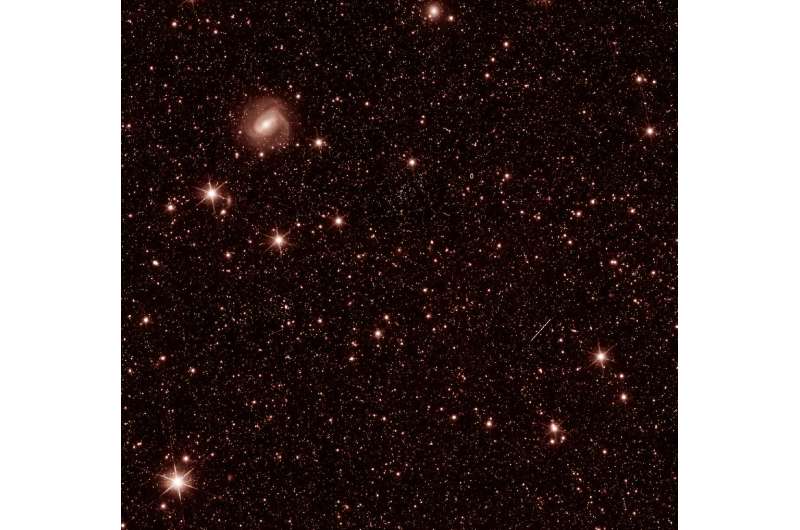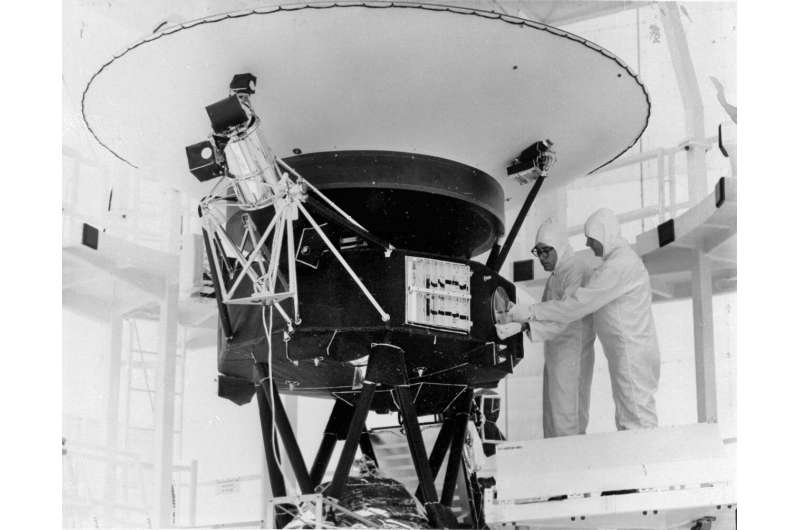
Copernical Team
Curiosity faces its toughest climb yet on Mars
 On Aug. 5, NASA's Curiosity rover will notch its 11th year on Mars by doing what it does best: studying the Red Planet's surface. The intrepid bot recently investigated a location nicknamed "Jau" that is pockmarked with dozens of impact craters. Scientists have rarely gotten a close-up view of so many Martian craters in one place. The largest is estimated to be at least as long as a basketball c
On Aug. 5, NASA's Curiosity rover will notch its 11th year on Mars by doing what it does best: studying the Red Planet's surface. The intrepid bot recently investigated a location nicknamed "Jau" that is pockmarked with dozens of impact craters. Scientists have rarely gotten a close-up view of so many Martian craters in one place. The largest is estimated to be at least as long as a basketball c Unraveling river pathways on Earth and Mars
 In a groundbreaking analysis, scientists from Tulane University have delved deep into the winding paths of rivers on both Earth and Mars. This study, recently published in Nature Geosciences, aims to understand how climate change influences the shifting paths of these meandering rivers.
Dr. Chenliang Wu, a postdoctoral researcher with Tulane University's School of Science and Engineering,
In a groundbreaking analysis, scientists from Tulane University have delved deep into the winding paths of rivers on both Earth and Mars. This study, recently published in Nature Geosciences, aims to understand how climate change influences the shifting paths of these meandering rivers.
Dr. Chenliang Wu, a postdoctoral researcher with Tulane University's School of Science and Engineering, NASA announces crew for 2024 ISS rotation mission
 NASA Friday announced four crew members that will fly on NASA's SpaceX Crew-8 mission for a long-term stay on the International Space Station.
The crew includes NASA astronauts Commander Matthew Dominick, Pilot Michael Barrat, and Mission Specialist Jeanette Epps, along with Roscosmos cosmonaut Mission Specialist Alexander Grebenkin.
They will all join Expedition 70 and 71 crew m
NASA Friday announced four crew members that will fly on NASA's SpaceX Crew-8 mission for a long-term stay on the International Space Station.
The crew includes NASA astronauts Commander Matthew Dominick, Pilot Michael Barrat, and Mission Specialist Jeanette Epps, along with Roscosmos cosmonaut Mission Specialist Alexander Grebenkin.
They will all join Expedition 70 and 71 crew m NASA and Axiom Space join forces for fourth private mission in 2024
 In a renewed commitment to the growth of private space ventures, NASA has announced another joint mission with Axiom Space. This mission, which will be the fourth private astronaut initiative, is slated for a tentative launch in August 2024 from NASA's Kennedy Space Center in Florida.
Phil McAlister, Director of Commercial Space at NASA Headquarters, emphasized the significance of the join
In a renewed commitment to the growth of private space ventures, NASA has announced another joint mission with Axiom Space. This mission, which will be the fourth private astronaut initiative, is slated for a tentative launch in August 2024 from NASA's Kennedy Space Center in Florida.
Phil McAlister, Director of Commercial Space at NASA Headquarters, emphasized the significance of the join Indian lunar landing mission enters Moon's orbit
 India's latest space mission entered the Moon's orbit on Saturday ahead of the country's second attempted lunar landing, as its cut-price space programme seeks to reach new heights.
The world's most populous nation has a comparatively low-budget aerospace programme that is rapidly closing in on the milestones set by global space powers.
Only Russia, the United States and China have prev
India's latest space mission entered the Moon's orbit on Saturday ahead of the country's second attempted lunar landing, as its cut-price space programme seeks to reach new heights.
The world's most populous nation has a comparatively low-budget aerospace programme that is rapidly closing in on the milestones set by global space powers.
Only Russia, the United States and China have prev First test images from Euclid space telescope unveiled

The Euclid space telescope, launched July 1 on a mission to shed more light on elusive dark matter and dark energy, has reached its destination orbit and on Monday its European operators revealed its first test images.
The star-filled snapshots were taken during the space telescope's commissioning—a phase during which its powerful instruments are finely calibrated—and therefore not representative of its full potential.
But the European Space Agency (ESA) says the tests already show it will be capable of fulfilling its massive mission.
"After more than 11 years of designing and developing Euclid, it's exhilarating and enormously emotional to see these first images," Euclid project manager Giuseppe Racca in a statement.
VA261: Ariane 5 timelapse
 Video:
00:04:59
Video:
00:04:59
The 117th and final launch of Europe’s Ariane 5 rocket capped a series which began in 1996. Commercial, institutional and scientific payloads included such iconic missions as Rosetta, the James Webb Space Telescope and Juice. Seen here is the launch campaign for VA261 on 5 July 2023, to close the Ariane 5 book; onboard were German aerospace agency DLR’s Heinrich Hertz experimental communications satellite and French communications satellite Syracuse 4b.
NASA back in touch with Voyager 2 after 'interstellar shout'

NASA has succeeded in re-establishing full contact with Voyager 2 by using its highest-power transmitter to send an "interstellar shout" that righted the distant probe's antenna orientation, the space agency said Friday.
Launched in 1977 to explore the outer planets and serve as a beacon of humanity to the wider universe, it is currently more than 12.3 billion miles (19.9 billion kilometers) from our planet—well beyond the solar system.
NASA hears signal from Voyager 2 spacecraft after mistakenly cutting contact

Photos: The first supermoon in August rises around the world

